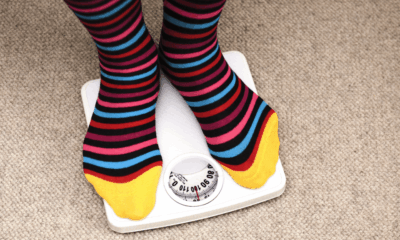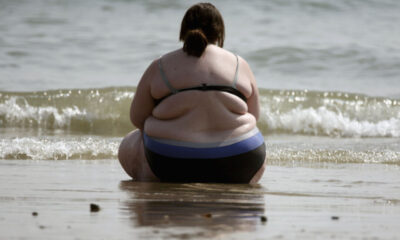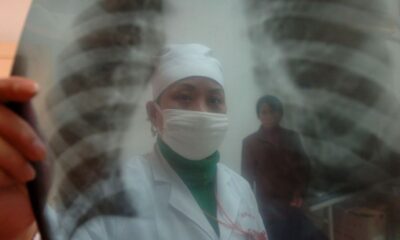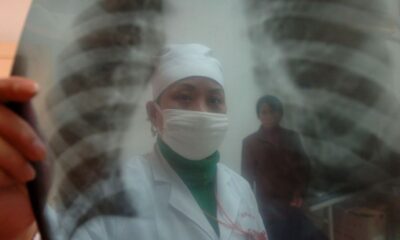Health
Resistance Exercise Boosts Recovery for Long COVID Patients

A new study reveals that a three-month program of resistance exercise significantly enhances physical and mental well-being in individuals suffering from long COVID. Conducted by the University of Glasgow in collaboration with NHS Greater Glasgow & Clyde, the University of Dundee, and NHS Tayside, these findings were presented at the American Heart Association’s Annual Scientific Sessions 2025 and published in JAMA Network Open.
The research involved over 230 participants diagnosed with COVID-19, either in community healthcare settings or hospitals. Participants were randomly assigned to two groups: one group engaged in resistance training as part of their ongoing healthcare, while the other received standard care without exercise intervention.
The results demonstrated measurable improvements. After three months, those who participated in the resistance training program showed a notable increase in their walking distance during the shuttle walk test compared to the control group. Additionally, participants in the exercise group reported higher grip strength and better overall quality of life, experiencing reduced anxiety and depression.
Understanding Long COVID’s Impact
Long COVID, characterized by lingering symptoms lasting longer than 12 weeks post-infection, has emerged as a significant health issue during the pandemic. Symptoms often include fatigue, breathlessness, and cognitive difficulties, commonly referred to as brain fog. According to Professor Colin Berry, principal investigator of the CISCO study and Professor of Cardiology and Imaging at the University of Glasgow, the study underscores the potential benefits of resistance training for those grappling with persistent COVID-19 symptoms.
“Our study demonstrates the benefits of resistance training on COVID-19 recovery, and suggests that people affected by persisting symptoms after COVID-19 could benefit by adopting this kind of exercise,” Berry stated. He emphasized that since 2020, research has indicated that long COVID can substantially impact quality of life, affecting both mental and physical health.
Tailored Exercise Programs for Recovery
Participants in the study underwent tailored exercise routines categorized based on their individual wellness and abilities. Initially, those who were bed-bound were instructed to perform exercises lying down, while those in recovery engaged in seated or standing exercises. All participants started with upper body exercises, gradually introducing lower body routines in the third week.
Stuart Gray, Professor of Muscle and Metabolic Health at the University of Glasgow and the study’s exercise intervention designer, remarked on the accessibility of the program. “The exercises were designed to be safe, simple, and easy to perform wherever and whenever convenient for the participant. This makes the intervention readily applicable to the wider community of individuals with long COVID,” he noted.
The study’s findings are part of the broader CISCO (Cardiac Imaging in SARS Coronavirus Disease) research initiative, which aims to enhance understanding of the health implications following COVID-19 hospitalization. The CISCO study closely monitored patients post-hospitalization and compared their recovery to a control group matched by age, sex, and medical history.
Jesse Dawson, Professor of Stroke Medicine at the University of Glasgow and Director of Research and Innovation at NHS Greater Glasgow and Clyde, expressed enthusiasm for the results. “We are delighted to have collaborated on this study. It is exciting that this resistance training intervention, which could be widely implemented, improved physical measures as well as anxiety and quality of life,” he stated, congratulating the study team and participants for their contributions.
Overall, this research highlights the potential of resistance exercise as a practical intervention for improving the quality of life of those affected by long COVID. By adopting such exercise regimens, individuals may find effective strategies to manage their symptoms and enhance their overall health.
-

 Science1 month ago
Science1 month agoNostradamus’ 2026 Predictions: Star Death and Dark Events Loom
-

 Technology2 months ago
Technology2 months agoOpenAI to Implement Age Verification for ChatGPT by December 2025
-

 Technology7 months ago
Technology7 months agoDiscover the Top 10 Calorie Counting Apps of 2025
-

 Health5 months ago
Health5 months agoBella Hadid Shares Health Update After Treatment for Lyme Disease
-

 Health5 months ago
Health5 months agoAnalysts Project Stronger Growth for Apple’s iPhone 17 Lineup
-

 Technology5 months ago
Technology5 months agoElectric Moto Influencer Surronster Arrested in Tijuana
-

 Education5 months ago
Education5 months agoHarvard Secures Court Victory Over Federal Funding Cuts
-

 Health5 months ago
Health5 months agoErin Bates Shares Recovery Update Following Sepsis Complications
-

 Technology6 months ago
Technology6 months agoDiscover How to Reverse Image Search Using ChatGPT Effortlessly
-

 Technology7 months ago
Technology7 months agoMeta Initiates $60B AI Data Center Expansion, Starting in Ohio
-

 Science4 months ago
Science4 months agoStarship V3 Set for 2026 Launch After Successful Final Test of Version 2
-

 Technology7 months ago
Technology7 months agoRecovering a Suspended TikTok Account: A Step-by-Step Guide





















